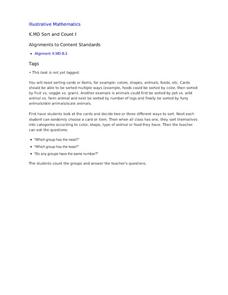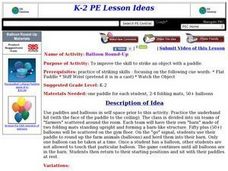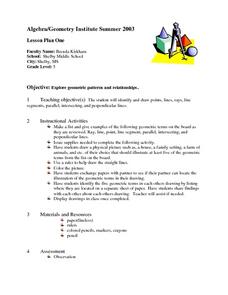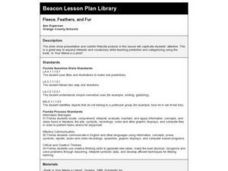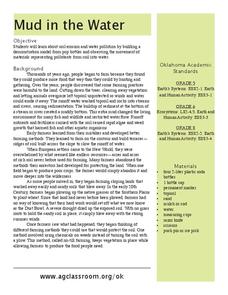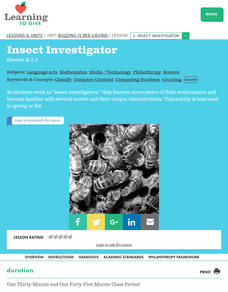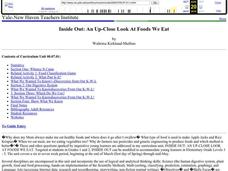Curated OER
Farm Animal Friends
Students apply basic communication and math skills to situations. They apply prior knowledge to list characteristics of different animals. They listen to music to engage multiple senses. Then images of animals are shared with them to...
Illustrative Mathematics
Sort and Count
Young mathematicians are on their feet and moving around in this primary grade sorting activity. After giving each child an object or picture card, they then sort themselves into groups, counting to see which has the most or least...
Curated OER
Balloon Round-Up
Students practice using paddles to hit objects. In this striking skills instructional activity, students use wooden paddles to round up balloon farm animals without touching the balloons with their hands.
Curated OER
Lesson Plan One: Points, Lines, Rays
Fifth graders explore basic geometric terms. Pupils draw a physical picture of a scene that illustrates at least five geometric terms. Partners exchange drawings and locate the illustration of geometric terms in the drawing.
Curated OER
A Field of Beans
Beans, or legumes as they are sometimes called, are the topic for an integrated multi-subject lesson. Youngsters will read, write, observe, and research everything there is to know about beans. They read a bean story, conduct a bean...
Curated OER
Fleece, Feathers, and Fur
Students improve vocabulary and explore predicting and categorizing after reading the book, Is Your Mama a Llama?
Curated OER
Agriculture in Motion
Youngsters learn about simple machines that could be used on a farm. They learn about agricluture, listen to a farmer speak, compare and contrast different farm machines, and then design their own. Note that although the publisher...
Curated OER
Mud in the Water
Sixth graders investigate erosion. In this erosion lesson, 6th graders explore how farming changes the environment. Students construct an erosion model and research ways to protect the soil from excess mud generated by farming.
Curated OER
Representing and Extending Patterns
Young scholars explore repeating and growing patterns. In this patterns lesson, students describe patterns, explore changing patterns and match patterns. Young scholars participate in online activities and read books that show patterns...
Curated OER
Food Safety and Quality Assurance
Students identify and interpret how milk is processed and learn important concepts in food safety and quality assurance. They identify how milk is processed, the importance of food safety, and the quality assurance process. Students also...
Curated OER
Space Age Technology Comes to Earth
Learners explore jobs related to agriculture. In this technology/agriculture lesson, students recognize the importance of natural resources and agriculture on the use of Range Rambler software. Learners complete an experiment and a...
Curated OER
Ani-mania
Pupils view and discuss Robert Harris' farm landscapes and create their own mural out of wood. In groups, they discuss various issues affecting pets throughout the world and create a way to protest or celebrate the issue. They try to...
Curated OER
Have and Have-Not
Learners describe the differences of people living in developed and underdeveloped countries. They also identify how each type of country uses their resources. They develop an ecological footprint of the countries discussed.
Curated OER
Insect Investigator
Young scholars examine and identify common insects. They observe these insects in their environment and keep track of how many they see. They use magnifying glasses and special hats to get into the role of an inspector.
Curated OER
Kansas vs the U.S.
Learners demonstrate an understanding of the physical and political geography of Kansas. They view maps and films to gain knowledge of Kansas. They calculate the percentage Kansas harvests for each crop out of the national total.
Curated OER
The Mister Runtles' Bet
Students listen to a story dealing with exponential and linear growth. After reading the story, students complete a table comparing information. Using a calculator, students graph the rice and daily population of flies. They study the...
Redefining Progress
Have and Have-Not
Is there a correlation between a country's wealth and the extent of its ecological footprint? What exactly constitutes an ecological footprint, and how does one country stack up against the rest? This is a unique lesson to incorporate...
Curated OER
Cute Calves of Just Tasty Steaks
Pupils examine the state of agriculture. In this animal husbandry instructional activity, students visit selected Web sites to research data on people's changing diets, farming practices, and animal health care.
Curated OER
Have You the Time of Day?
Students read a story about a day in the life of a farmer. They practice reading and writing time. They write a picture story about his or her day. They draw clock faces showing what time of day each of the events occurred.
Curated OER
Inside Out: An Up-Close Look At Foods We Eat
Fourth graders identify the origins of meats and vegetables consumed by humans on a daily basis. They classify foods (meats, dairy products, grains...) and create a food pyramid.
Curated OER
Hoosier Artists
Pupils examine the paintings of various Indiana artists. Using the internet, they relate the landscapes shown to the history of the state and how it affected Native Americans. Using the information they gathered, they write story...



